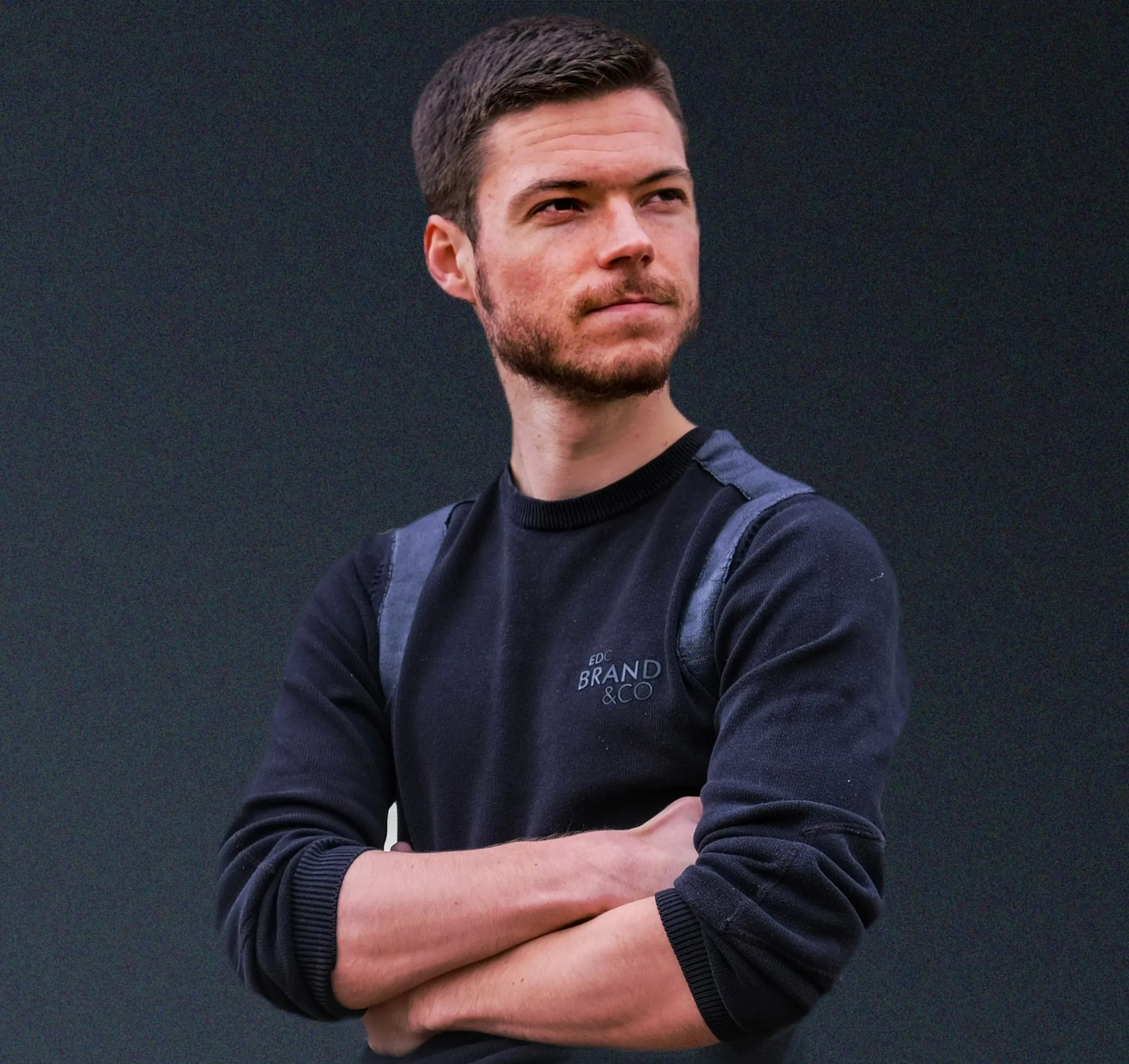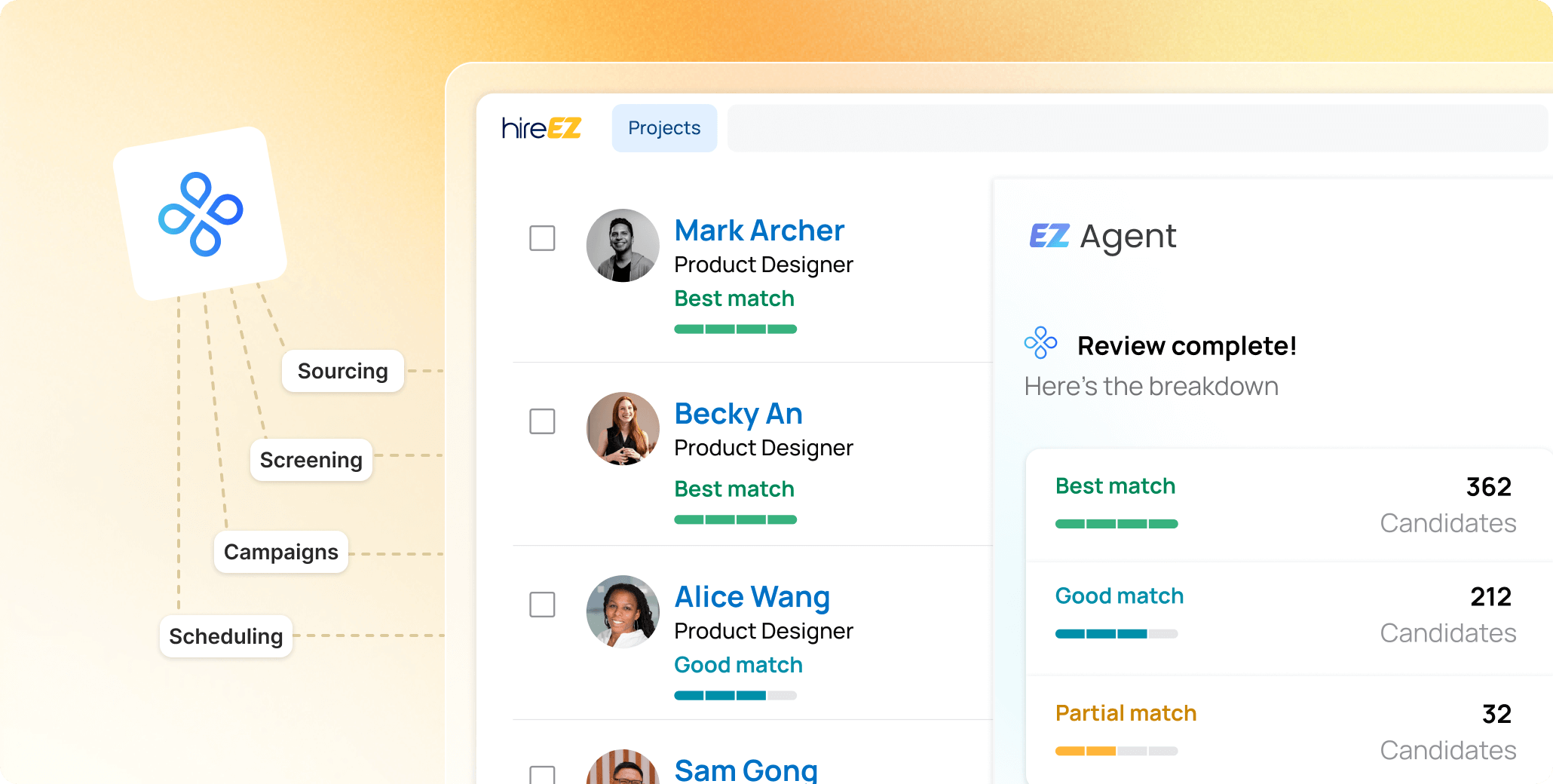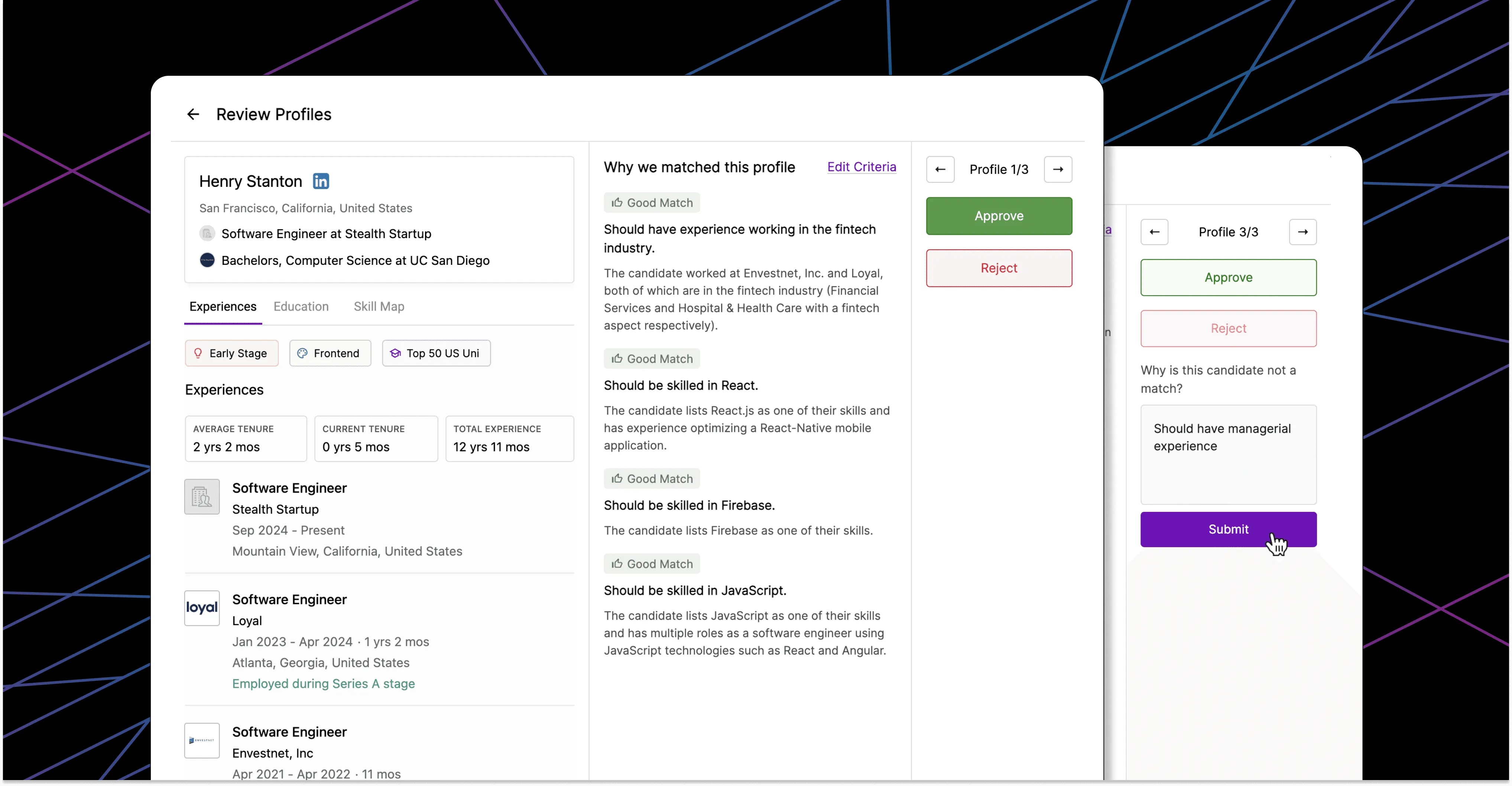Interview Process : how to structure and improve it

Between scheduling conflicts, endless note-taking, and juggling multiple candidates, the interview process can be overwhelming.
How to streamline everything while focusing on what matters: finding the best fit for your team?
In this article, we'll break down each stage of the interview process, offer practical strategies to improve your workflow, and show how you how to save time and eliminate manual tasks.
The Different Stages of the Interview Process

When you're hiring, it's essential to break the interview process into clear stages. This helps you evaluate candidates thoroughly without missing key details :
1. Screening Stage
The screening stage is your first filter for weeding out candidates who don’t meet the basic requirements. Typically, this involves a brief phone or video call where you verify their qualifications and assess initial job fit. You'll likely ask about their experience, skills, and availability.
This stage saves you time by focusing only on the essentials—are they qualified for the role, and are they worth moving forward? It also gives the candidate a chance to understand the position better and ask any initial questions they may have.
Some companies now use asynchronous screening tools, where candidates respond to a set of pre-recorded questions. This approach lets candidates answer at their convenience, and you can review their responses when it fits your schedule. It’s an efficient way to handle large volumes of applicants without compromising on quality.
2. In-Depth Interview Stage
Once a candidate passes the screening, you dive deeper with an in-depth interview. Here, you'll explore both their technical skills and how they approach problem-solving.
At this stage, focus on both job-specific skills and soft skills. For example, if you're hiring for a project management role, you might ask, “Can you tell me about a time when a project fell behind schedule and how you handled it?” This helps you understand how they handle pressure and manage team dynamics.
Structured interviews are especially helpful here. By asking the same questions to every candidate, you ensure that the process is fair and consistent. You’ll also find it easier to compare candidates later.
3. Skills and Role Fit Assessments
In many cases, you'll want to include a skills assessment to make sure the candidate can actually do the job. This could be a coding test, writing assignment, or any task that reflects the day-to-day responsibilities of the role.
A practical test allows you to see the candidate in action, so you're not just relying on what they say during the interview. It also reduces the chances of hiring someone who interviews well but can’t perform when it matters. For example, if you're hiring a designer, you might ask them to create a mock-up based on a brief you provide.
Asynchronous assessments are also an option, where candidates complete the tasks in their own time. This is useful when you have multiple candidates and want to streamline the process.
4. Cultural Fit Assessment
Cultural fit is just as important as technical skills. Even if a candidate has the right experience, if they don’t align with your company’s values or work style, they may not thrive in the role.
During this stage, you'll focus on understanding whether the candidate fits into your company’s culture. This is often a more informal conversation, where you ask questions about how they like to work, how they handle feedback, and what they value in a workplace.
For example, you might ask, “What kind of work environment do you perform best in?” or “Can you describe a time when you had to collaborate with a difficult colleague?” These questions help you gauge whether they will fit into your existing team dynamic.
5. Final Interview and Decision-Making
By the time you reach the final stage, you should have a good idea of whether the candidate is a good fit.
At this point, you might bring in senior leaders or team members for a final round of input. Their feedback can be invaluable in ensuring the candidate not only fits the role but will also be a good long-term investment for the company.
How to Improve Your Interview Process

Improving your interview process not only helps you save time, it also helps you make better hiring decisions. A few tweaks can significantly elevate the quality of candidates you bring. Here are five ways to make your interview process more effective :
Cut Down on Interview Rounds
One common mistake in the hiring process is conducting too many interview rounds. Candidates get frustrated, and you waste time. Instead, optimize by focusing on what matters most in the first few interviews. For example, combine technical assessments and soft skills evaluation in one round, rather than separating them.
If you're still unsure about a candidate after two rounds, it's a sign you may need to reassess your interview criteria or structure.
Add Post-Interview Reflection Time
One overlooked improvement is taking time immediately after the interview for reflection. Set aside 10 to 15 minutes after each interview to jot down notes while the conversation is still fresh. Delaying this can lead to forgetfulness or misjudgments later on.
More importantly, this reflection allows you to review the candidate holistically. Did they align with the job description? Were their answers genuine or overly polished? These insights will help you make more thoughtful, balanced decisions.
Standardize Your Interview Questions
One of the simplest ways to improve your process is to standardize your questions. Create a core set of questions that you ask every candidate, focusing on both skills and behaviors relevant to the job. This ensures consistency across interviews and allows for easier comparisons between candidates.
Use Structured Evaluation Criteria
Along with standard questions, it’s important to use a consistent evaluation framework. Develop a scoring rubric that allows you to rate candidates on specific competencies, such as problem-solving, communication, and technical skills. This helps you make data-driven decisions rather than relying on subjective impressions.
For example, if you're hiring a project manager, create a list of key skills (e.g., leadership, time management) and rate each candidate on these aspects after the interview. This method ensures fairness and makes it easier to identify top candidates.
Leverage Behavioral Data for Better Cultural Fit Assessment
Cultural fit is tricky because it can be subjective. Instead of relying on gut feelings, use behavioral assessments to gain insights into a candidate’s work style and values. Tools like personality tests or situational judgment tests can help you assess whether a candidate aligns with your company’s values.
For example, a candidate might be technically strong but could struggle in a highly collaborative environment. These assessments give you hard data on their work preferences, decision-making style, and adaptability, which are harder to gauge in a standard interview.
Automating your interview process: Noota
.jpeg)
Interviewing is time-consuming, and when you're juggling multiple candidates, it’s easy to lose focus on what matters—assessing the candidate properly. This is where Noota, an AI-powered interview assistant, steps in :
- Automated Recording and Transcriptions : Noota automatically records and transcribes all your interviews, so you don’t have to take notes while trying to engage with the candidate. This means you can give your full attention to the conversation without worrying about missing key details. Once the interview is over, you’ll have a clean, accurate transcript ready for review.
- Data-Driven Insights and Analysis : Noota doesn’t stop at transcription. It goes a step further by analyzing the content of the interview to extract key points, skills, and competencies. This helps you evaluate candidates more objectively, using data rather than just your memory or first impressions.
- Streamlined Team Collaboration : With Noota, sharing interview insights with your hiring team is seamless. Noota generates structured reports that you can easily distribute to other decision-makers. This ensures everyone has the same information and avoids any miscommunication.
You want to automate your interview process ? Try Noota for free.
Leverage your Interview Data
AI interview notes, scorecard, follow-up, ATS integration, and more...
Related articles

Forget note-taking and
try Noota now
FAQ
In the first case, you can directly activate recording as soon as you join a videoconference.
In the second case, you can add a bot to your videoconference, which will record everything.
Noota also enables you to translate your files into over 30 languages.

.svg)
.svg)

.webp)

.png)


.svg)
